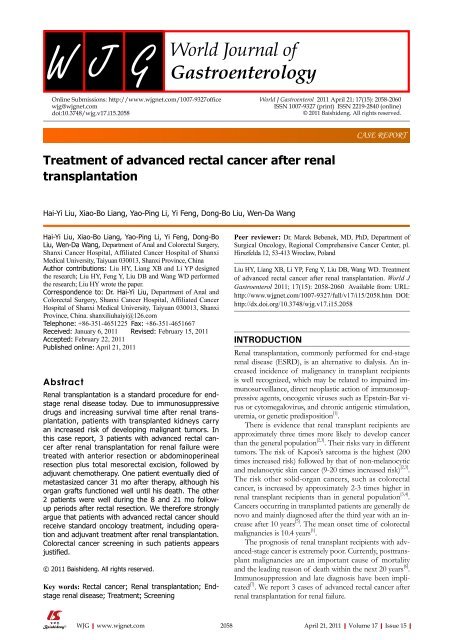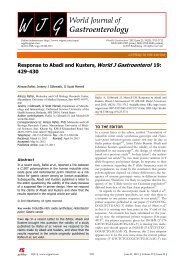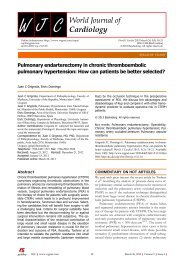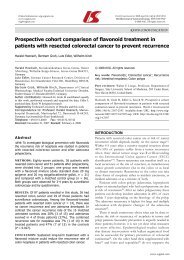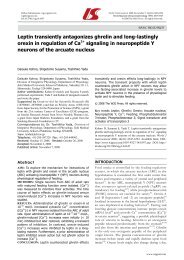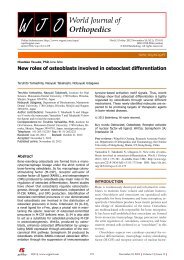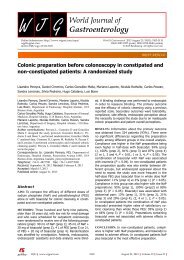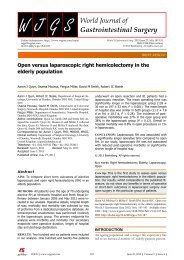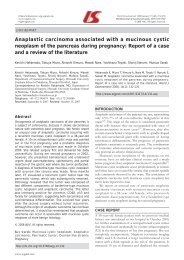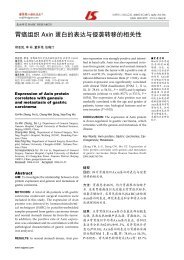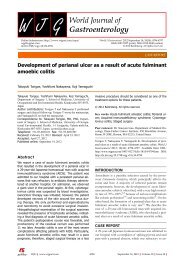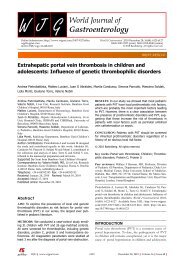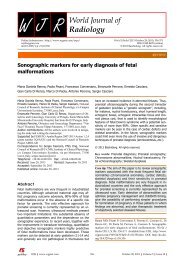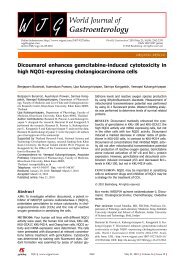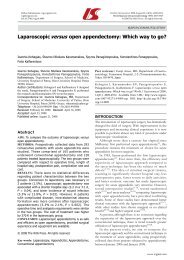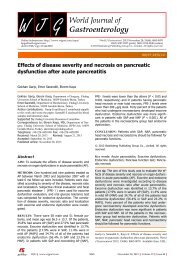Tetracycline-inducible protein expression in pancreatic cancer cells
Tetracycline-inducible protein expression in pancreatic cancer cells
Tetracycline-inducible protein expression in pancreatic cancer cells
Create successful ePaper yourself
Turn your PDF publications into a flip-book with our unique Google optimized e-Paper software.
Onl<strong>in</strong>e Submissions: http://www.wjgnet.com/1007-9327office<br />
wjg@wjgnet.com<br />
doi:10.3748/wjg.v17.i15.2058<br />
Treatment of advanced rectal <strong>cancer</strong> after renal<br />
transplantation<br />
Hai-Yi Liu, Xiao-Bo Liang, Yao-P<strong>in</strong>g Li, Yi Feng, Dong-Bo Liu, Wen-Da Wang<br />
Hai-Yi Liu, Xiao-Bo Liang, Yao-P<strong>in</strong>g Li, Yi Feng, Dong-Bo<br />
Liu, Wen-Da Wang, Department of Anal and Colorectal Surgery,<br />
Shanxi Cancer Hospital, Affiliated Cancer Hospital of Shanxi<br />
Medical University, Taiyuan 030013, Shanxi Prov<strong>in</strong>ce, Ch<strong>in</strong>a<br />
Author contributions: Liu HY, Liang XB and Li YP designed<br />
the research; Liu HY, Feng Y, Liu DB and Wang WD performed<br />
the research; Liu HY wrote the paper.<br />
Correspondence to: Dr. Hai-Yi Liu, Department of Anal and<br />
Colorectal Surgery, Shanxi Cancer Hospital, Affiliated Cancer<br />
Hospital of Shanxi Medical University, Taiyuan 030013, Shanxi<br />
Prov<strong>in</strong>ce, Ch<strong>in</strong>a. shanxiliuhaiyi@126.com<br />
Telephone: +86-351-4651225 Fax: +86-351-4651667<br />
Received: January 6, 2011 Revised: February 15, 2011<br />
Accepted: February 22, 2011<br />
Published onl<strong>in</strong>e: April 21, 2011<br />
Abstract<br />
Renal transplantation is a standard procedure for endstage<br />
renal disease today. Due to immunosuppressive<br />
drugs and <strong>in</strong>creas<strong>in</strong>g survival time after renal transplantation,<br />
patients with transplanted kidneys carry<br />
an <strong>in</strong>creased risk of develop<strong>in</strong>g malignant tumors. In<br />
this case report, 3 patients with advanced rectal <strong>cancer</strong><br />
after renal transplantation for renal failure were<br />
treated with anterior resection or abdom<strong>in</strong>oper<strong>in</strong>eal<br />
resection plus total mesorectal excision, followed by<br />
adjuvant chemotherapy. One patient eventually died of<br />
metastasized <strong>cancer</strong> 31 mo after therapy, although his<br />
organ grafts functioned well until his death. The other<br />
2 patients were well dur<strong>in</strong>g the 8 and 21 mo followup<br />
periods after rectal resection. We therefore strongly<br />
argue that patients with advanced rectal <strong>cancer</strong> should<br />
receive standard oncology treatment, <strong>in</strong>clud<strong>in</strong>g operation<br />
and adjuvant treatment after renal transplantation.<br />
Colorectal <strong>cancer</strong> screen<strong>in</strong>g <strong>in</strong> such patients appears<br />
justified.<br />
© 2011 Baishideng. All rights reserved.<br />
Key words: Rectal <strong>cancer</strong>; Renal transplantation; Endstage<br />
renal disease; Treatment; Screen<strong>in</strong>g<br />
WJG|www.wjgnet.com<br />
2058<br />
World J Gastroenterol 2011 April 21; 17(15): 2058-2060<br />
ISSN 1007-9327 (pr<strong>in</strong>t) ISSN 2219-2840 (onl<strong>in</strong>e)<br />
© 2011 Baishideng. All rights reserved.<br />
CASE REPORT<br />
Peer reviewer: Dr. Marek Bebenek, MD, PhD, Department of<br />
Surgical Oncology, Regional Comprehensive Cancer Center, pl.<br />
Hirszfelda 12, 53-413 Wroclaw, Poland<br />
Liu HY, Liang XB, Li YP, Feng Y, Liu DB, Wang WD. Treatment<br />
of advanced rectal <strong>cancer</strong> after renal transplantation. World J<br />
Gastroenterol 2011; 17(15): 2058-2060 Available from: URL:<br />
http://www.wjgnet.com/1007-9327/full/v17/i15/2058.htm DOI:<br />
http://dx.doi.org/10.3748/wjg.v17.i15.2058<br />
INTRODUCTION<br />
Renal transplantation, commonly performed for end-stage<br />
renal disease (ESRD), is an alternative to dialysis. An <strong>in</strong>creased<br />
<strong>in</strong>cidence of malignancy <strong>in</strong> transplant recipients<br />
is well recognized, which may be related to impaired immunosurveillance,<br />
direct neoplastic action of immunosuppressive<br />
agents, oncogenic viruses such as Epste<strong>in</strong>-Bar virus<br />
or cytomegalovirus, and chronic antigenic stimulation,<br />
uremia, or genetic predisposition [1] .<br />
There is evidence that renal transplant recipients are<br />
approximately three times more likely to develop <strong>cancer</strong><br />
than the general population [2,3] . Their risks vary <strong>in</strong> different<br />
tumors. The risk of Kaposi’s sarcoma is the highest (200<br />
times <strong>in</strong>creased risk) followed by that of non-melanocytic<br />
and melanocytic sk<strong>in</strong> <strong>cancer</strong> (9-20 times <strong>in</strong>creased risk) [2,3] .<br />
The risk other solid-organ <strong>cancer</strong>s, such as colorectal<br />
<strong>cancer</strong>, is <strong>in</strong>creased by approximately 2-3 times higher <strong>in</strong><br />
renal transplant recipients than <strong>in</strong> general population [3,4] .<br />
Cancers occurr<strong>in</strong>g <strong>in</strong> transplanted patients are generally de<br />
novo and ma<strong>in</strong>ly diagnosed after the third year with an <strong>in</strong>crease<br />
after 10 years [5] . The mean onset time of colorectal<br />
malignancies is 10.4 years [1] .<br />
The prognosis of renal transplant recipients with advanced-stage<br />
<strong>cancer</strong> is extremely poor. Currently, posttransplant<br />
malignancies are an important cause of mortality<br />
and the lead<strong>in</strong>g reason of death with<strong>in</strong> the next 20 years [6] .<br />
Immunosuppression and late diagnosis have been implicated<br />
[7] . We report 3 cases of advanced rectal <strong>cancer</strong> after<br />
renal transplantation for renal failure.<br />
April 21, 2011|Volume 17|Issue 15|


